Healthcare Workers Address Vaccine Skepticism Amid Romania's Measles Surge

Romania faces a rising measles outbreak driven by low vaccine coverage and misinformation. Healthcare workers are actively fighting vaccine skepticism to protect communities and curb the epidemic.
Romania has been facing a significant increase in measles cases, with health professionals working tirelessly to combat vaccine hesitancy that hampers immunization efforts. In the rural regions of northeastern Romania, epidemiologist Daniela Gafita visits remote villages to educate local communities about the severity of measles and the importance of vaccination. Despite her efforts, many parents remain wary, often influenced by misinformation and myths circulating online.
Last year, Europe experienced a peak in measles cases over the past 25 years, with Romania bearing the brunt. Out of approximately 18,000 cases across the European Economic Area from June 2024 to May 2025, Romania reported 13,000 cases. The disease’s resurgence is not limited to Europe; globally, countries like the United States are experiencing their worst epidemic in decades, largely fueled by anti-vaccine propaganda spread via social media platforms.
Romania's vaccination coverage is alarmingly low at just 62%, well below the 95% rate recommended by the World Health Organization for effective herd immunity. Factors such as poverty, limited access to healthcare, and persistent misconceptions about vaccine safety — particularly beliefs linking vaccines to autism — contribute to this issue.
Many residents express fears and skepticism about vaccination. For instance, Elena Armenia from Raucesti village refuses to vaccinate her youngest child after reading online about supposed links to autism, despite scientific evidence disproving such claims. Meanwhile, cases of measles have resulted in hospitalizations and, tragically, several deaths, including eight in Romania within the recent year.
Healthcare providers like family doctor Monica Apostol admit they face significant challenges in persuading hesitant parents. The situation is compounded by political influences, with some far-right figures actively opposing vaccination mandates, claiming they infringe on personal freedoms. This stance has gained political traction, as seen in the recent presidential elections.
Proactively, Romanian health authorities and advocates are calling for stronger measures, including mandatory vaccination for school attendance, despite remaining unpopular among certain groups. Leaders acknowledge the need to rebuild public trust and counteract the misinformation campaigns that threaten public health.
This ongoing struggle underscores the importance of continuous public education, accessible healthcare, and community engagement to improve vaccination rates and prevent future outbreaks.
Stay Updated with Mia's Feed
Get the latest health & wellness insights delivered straight to your inbox.
Related Articles
New Biomarker Advances Personalized Treatment for ER+ Breast Cancer Patients
Researchers identify a biomarker that could predict responsiveness to CDK4/6 inhibitors in ER+ breast cancer, paving the way for more personalized therapies and improved patient outcomes.
Are Probiotics a Cost-Effective Strategy to Prevent Infection Post-Colon Surgery?
A UCLA study evaluates the cost-effectiveness of probiotics in preventing pouchitis after colon removal surgery, highlighting benefits for frequent relapses but questioning overall economic value.
Smartphone Data Predicts Recovery Outcomes After Bone Fractures
Innovative study reveals how smartphone mobility data can predict recovery outcomes in patients with broken legs or hips, paving the way for personalized treatment plans.
Increased Risk of COPD Among Individuals with Schizophrenia: New Research Findings
New research reveals that individuals with schizophrenia face a higher risk of developing COPD, emphasizing the importance of comprehensive healthcare and routine screenings for respiratory issues in this vulnerable population.



